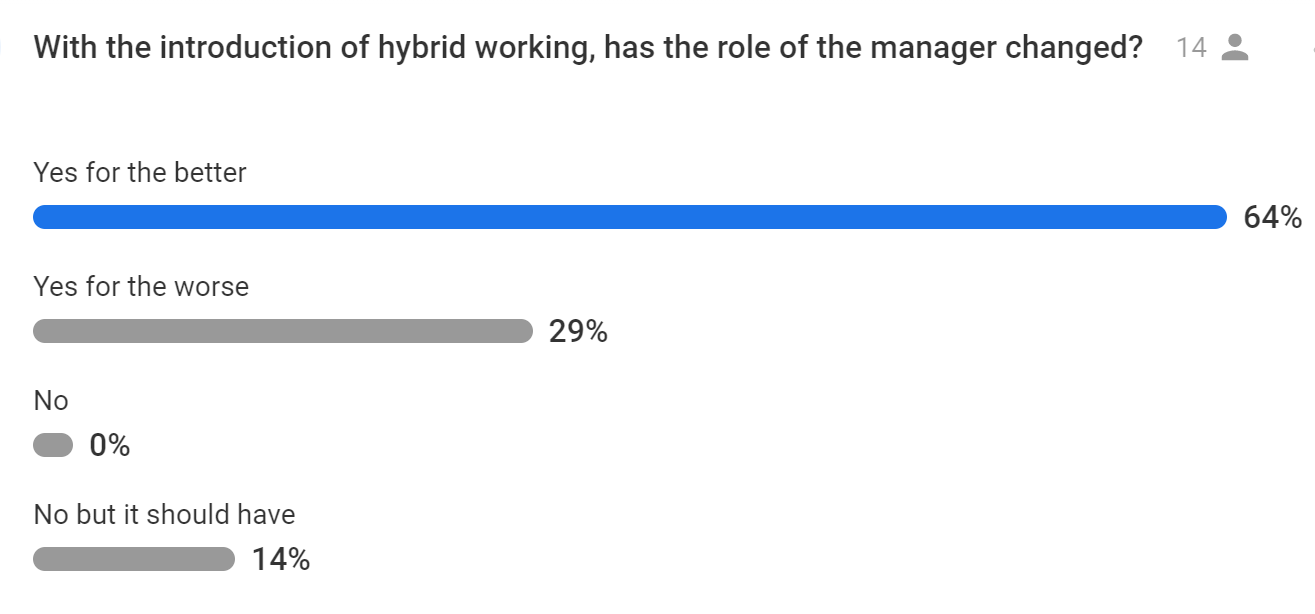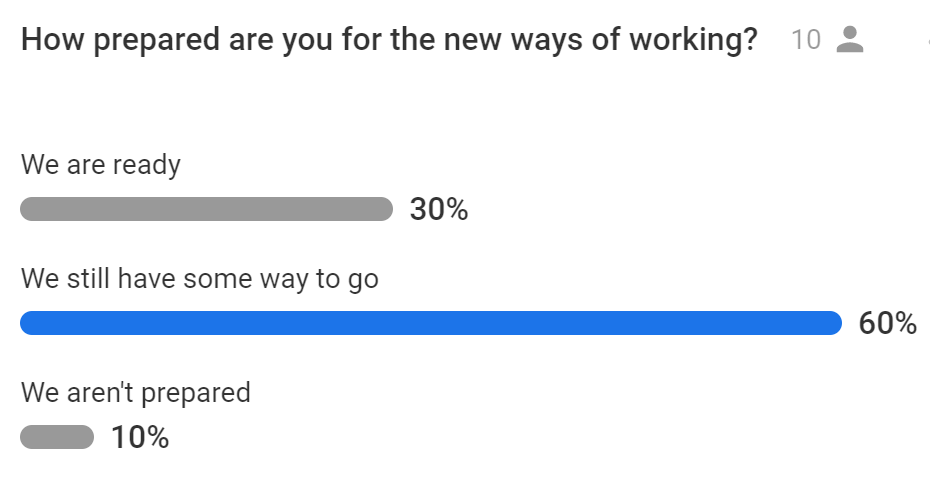Willis Towers Watson's Hybrid Working Network Roundtable
Employees' day-to-day experiences of work have always been hugely impacted by the relationship they have with their managers and the way in which they operate.

“We've seen a real increase in managers being more understanding. How do we ensure that they continue with that? Particularly when you consider some of the diversity, equity and inclusion aspects around making sure that flexible working is taken up by all genders and not just defaulting to one.”
Attendee
As we collectively negotiate new ways of working, squeezed middle managers are caught between balancing organisational priorities with employee needs. This tension is more acute than ever.
At the same time, managers feel a greater sense of responsibility for their teams than ever before. Via the medium of a screen, managers have been let into people's houses, met their families, admired their pets. This builds much stronger bonds.
Managers’ fundamental responsibilities haven’t changed. They are still organisational conduits: they must communicate priorities, values and expectations from the top down, while supporting and listening to their teams and conveying their feedback upwards.
However, much more is being expected of managers. As well as performing their usual role, managers have had to adapt to a host of changes.
Many managers have recruited people in an unfamiliar virtual setting. They have trusted people to carry out their work virtually. They’ve built trust and empathy in a virtual environment and have been supporting people who have struggled.
As organisations have made decisions throughout the pandemic, managers have been on the front line of communicating those changes to their teams and taking their feedback on board. And now that we are navigating the transition into the ‘new normal’, yet again, managers are at the coal face.
“You need to figure out how to build trust and empathy with every single member of your team. Oh, and by the way, you've got to do that and still get your day job done. It's huge.”
Attendee
Managers must be careful to evaluate people based on their output, rather than their visibility. Many will be looking after teams who will have different working patterns as we emerge from the pandemic. If, for instance, a manager is regularly in the office on the same day as Team Member A but not Team Member B, they must be careful to avoid favouring Team Member A.
Another HR attendee made the important, related point that managers should be democratic with their time and make sure that people are treated equally. It's much easier to have water cooler conversations in the office; managers should make sure they're also checking in regularly with people who are working remotely.
"It's been very well documented that when people are in a virtual or hybrid environment that the people who aren't in front of their manager as much as others won't progress as quickly", observed one HR professional. "I'm interested to see whether, as our new working environment evolves, managers will be more empathetic and open minded to people working from home, and therefore more likely to promote them, or whether it is going to be harder for people in the hybrid working environment to continue to progress."
This problem is particularly acute for new generations entering the workforce. They benefited more than any other cohort from observing, listening to conversations across desks and being able to ask questions freely and informally. Now, senior leaders may be less accessible than before. Organisations must think carefully about how to create learning opportunities in this new environment.
Successful managers will be aware of these challenges and reflecting continually on how to manage their team more effectively.
In the last section, we examined some of the new challenges managers face. Does this mean they are spending more time on managing? Answers within the group discussion were mixed. That’s because it’s a mixed picture, observed one HR leader, who said that within her organisation, she observed some managers putting in more time and focus and others spending less time managing than they were before.
Perhaps the real focus should be on the quality of the interactions they have with their team. If managers are continuing to have more meaningful conversations and supporting their team members' work lives in a deeper way than before, this approach could be more fruitful than more regular, surface-level catch-ups.
Another time win for managers in the new virtual environment is that it can be easier to find and engage with the right person at the right time, meaning decisions get made more quickly. "I think conversations are a bit more efficient," said one HR leader. "There are people accessible to me now from home. For example, the CEO and I have a really regular catch-up where we connect on a video call. Rarely, before, would I have thought it appropriate to just walk into his office."
We're in the middle of a big experiment, and so much is unknown.
One HR leader shared that she manages 20 people but has only met two of them in real life. "Everyone's life situation is completely different, and everyone's motivation comes from different places. I think to be a great mentor, you need to figure out how to build that trust and empathy with every single member of your team. Oh, and by the way, you've got to do that and still get your day job done. It's huge. So that's why we can't possibly be nailing it yet because we're still learning."
Read More
Staying flexible about flexibility
Another HR colleague shared a comment from a senior leader in her organisation. "She said it's just a big experiment. And so, we just need to work together and find our way through the experiment, acknowledge that we might not get it right first time and accept we'll continue to evolve and check on how we're doing."
Only by listening to managers' concerns can we help them to develop the skills they need. One HR leader mentioned an article which characterises hybrid working leaders as champions, strivers, resistors and laggards. "You can really start to spot managers who fall into one of those categories," she observed.
Her organisation is starting to tailor the guidance they give to managers, so that people who are struggling and don't know where to begin can access basic starting points, while managers who fall into champion or striver categories can also develop their skills.
Managers may come into the office on certain days and see certain people. They should make sure they continue to delegate work and split the time they spend checking in with their teams in an equitable way.
As Stephanie Rudbeck, a Senior Director in Willis Towers Watson's Talent & Reward team says: "If I think about my experience as a manager in the pandemic, I've needed to really focus on listening in a different way. I've had to be much more disciplined about scheduling catch ups with the people I manage. And I've had to really challenge my biases as well, not overly favouring those I have more interaction with over those who I don't."
As an article in Forbes explained: "Empathy has always been a critical skill for leaders, but it is taking on a new level of meaning and priority. Far from a soft approach it can drive significant business results."
People's lives have changed dramatically in the pandemic. Many have found this really challenging to their mental health, whether they're grieving, anxious about the future, or suffering from burnout. They need understanding and empathy from their managers, who should be encouraged to check in regularly, listen actively and be ready to direct people towards further emotional support, should they need it.
Managers have needed to trust team members who are working remotely throughout the pandemic. This shouldn't change now that some people are returning to the office. One way to alienate people is to micromanage them, especially after the pandemic, which required managers to take leaps of trust. People are now accustomed to working flexibly; good managers will recognise that this change is permanent.
Several HR leaders were concerned about how to evaluate performance in a hybrid world. As one summarised: "It's been very well documented that when people are in a virtual environment or hybrid environment that the people who aren't in front of their manager won't progress as quickly as those who are."
Managers may have to think more carefully about setting tangible goals, which are measurable whether someone works from home or in the office, suggested Angela Paul, Research Director at Willis Towers Watson.
In such a fast-changing environment, it's vital to make sure that managers and their teams have a good foundation to work from. Organisations may have changed direction in the pandemic or re-evaluated some aspects of how they work; HR leaders should make sure that everyone has a clear understanding of their organisation's purpose, values and goals, added Fran Fisher, Talent & Reward Director. With that infrastructure in place, managers and their direct reports will feel fully empowered to operate independently.

Thanks so much for reading. At this time of change, we think convening to share our experiences and insights is so important. We hope it's inspired you with some new ideas to take back to your organisations.
Sources:
www.gartner.com/smarterwithgartner/are-you-a-hybrid-workforce-champion-or-a-laggard
www.forbes.com/sites/tracybrower/2021/09/19/empathy-is-the-most-important-leadership-skill-according-to-research/